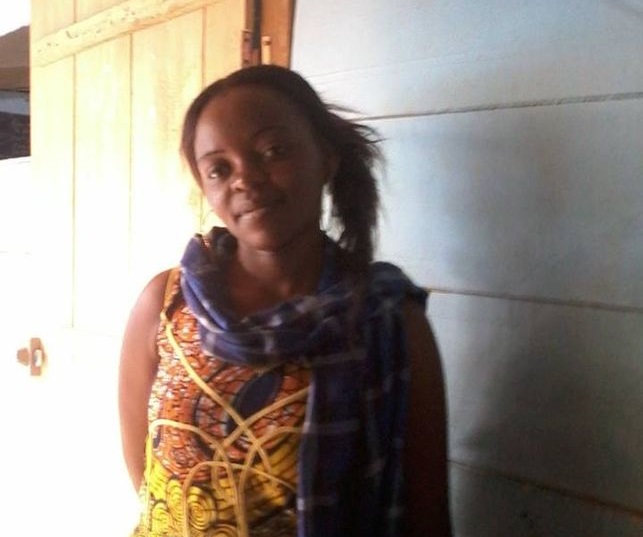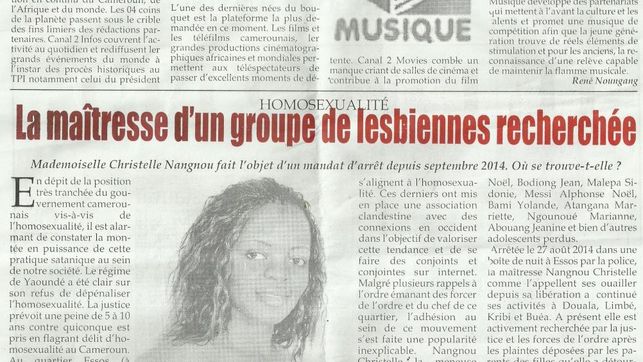
Photo of Christelle Nangnou taken in Cameroon. Retrived from eldiario.es under license CC BY-SA 3.0
Christelle Nangnou, a young lesbian from Cameroon, arrived in Madrid on March 25 asking for political asylum due to the persecution of gay people in her home country. She is currently being sought out by the Cameroon government, and if captured, could spend five to 10 years in prison because of her sexual orientation.
According to a statement on eldiario.es, she arrived at Barajas airport with false documentation and an article cut out from a newspaper reporting that the Cameroonian police were searching for her because they accused her of being “the ringleader of a lesbian group”. The article also stated that homosexuality is seen as a “satanic practice.” Spanish authorities refused her request for asylum; they claimed doubts as to the truth of her story and ordered that she be deported.

Christelle Nangnou presents this article cutout to authorities to show that she is being victimized due to her sexuality. Image from eldiario.es under license CC BY-SA 3.0
Christelle received assistance from lawyer Eduardo Gómez of the Red Jurídica law firm, who was the only person authorized to visit her whilst in confinement. Gómez appealed her case to the National High Court, but it was denied. Therefore, he turned to the European Court of Human Rights, which halted deportation until the case was resolved and established a April 17 deadline for submitting evidence corroborating Christelle's story. It's possible this suspension came just in time thanks only to her unwavering resistance against extradition:
Han intentado expulsarme y meterme en un avión tres veces, pero me he resistido. Tengo un golpe en el ojo derecho, una uña arrancada, me duele todo el cuerpo y estoy mareada por todo el trajín. Les he dicho que no puedo volver a mi país porque allí no puedo tener vida.
Three times they've tried to put me on a plane and deport me; but, I've resisted. I hurt all over, I have a bruise on my right eye, a nail ripped out, and I feel faint from all the commotion. I've told them that I can't go back to my country because there I can't have a life.
Meanwhile, several media outlets spread the news. La Federación Estatal de Lesbianas, Gais, Transexuales y Bisexuales (National Federation of Lesbians, Gays, Transexuals and Bisexuales) started a petition on Change.org asking the minister of the interior to consider asylum for the young Cameroonian. Red Jurídica sent out a tweet reporting that the petition accumulated 21,000 signatures within the first six hours, ultimately leading to more than 67,700.
Several members of Spain's parliament from various political parties put pressure on government institutions to rectify their decision on deporting Nangnou:
Representantes de los grupos parlamentarios del PSOE, Amaiur, Izquierda Plural, PNV, CiU, UPyD y ERC han mantenido este miércoles una reunión en la Subdirección General de la Policía con responsables de la Oficina de Asilo y Refugio y expertos de la Comisión Española de Ayuda al Refugiado (CEAR) para buscar una solución, y han determinado que se acoja a la posibilidad de una autorización de entrada y estancia en España por motivos humanitarios, trámite que han encomendado a CEAR.
This Wednesday, representatives from the parliamentary groups PSOE, Amaiur, Izquierda Plural, PNV, CiU, UpyD, and EC had a meeting at the Sub-Directorate General of Police with the heads of the Asylum and Refuge Office and experts from the Spanish Refugee Aid Commission (known in Spanish as CEAR) in search for a solution; and they have determined the possibility of authorizing entry and stay in Spain on humanitarian grounds; a process that has been entrusted to the CEAR.
All of the efforts finally paid off. On April 15—after 24 days of being retained at the airport—the Spanish government granted Christelle Nangnou a special resident permit on “humanitarian grounds.”
Although Spain is one of the world's more tolerant countries in regards to LGBT rights, its governmental institutions are not as inclined to granting asylum. According to the website Cáscara amarga (The Bitter Peel):
Patricia Bárcena, de la Comisión Española de Ayuda al Refugiado (CEAR), ha denunciado la mala praxis en cuanto a la gestión de las peticiones de asilo político en España. Bárcena lamenta que, a pesar de que la ley no exige una prueba plena de la situación de peligro, en la práctica sí que se está exigiendo. “Para aceptar la solicitud no hace falta que haya una amenaza concreta justo contra la persona demandante de asilo, sino una situación de guerra o persecución contra un grupo de gente que implica riesgo para esa persona”, ha explicado.
Patricia Bárcena of the Spanish Refugee Aid Commission has reported malpractice in regards to the management of political asylum petitions in Spain. Bárcena regrets that despite the fact that the law does not require proof of a dangerous situation, in practice, that is exactly what is being done. “In order to approve the request, there does not need to be a specific threat against the aslyum-seeking individual, but rather a situation of war or persecution against a group of people that puts that person's life at risk,” she explained.
Colegas, a collective of several Spanish gay associations, issued a press release asking the Spanish government “for greater flexibility in granting asylum to LGBT persons fleeing persecution.” Its president, Paco Ramírez, stated:
Las pruebas exigidas a los solicitantes de asilo deben tener en cuenta que muchas veces tienen que huir sin tiempo para recabar documentación probatoria de la persecución y amenaza de la que son objeto. Resulta desde todo punto de vista incongruente que tengamos una Ley de Asilo que reconoce la persecución por orientación sexual e identidad de género, y luego se lo pongamos tan difícil a muchas personas que han atravesado todo un infierno, muchas veces arriesgando su propia vida, para llegar a un país como España que creen un oasis de libertades y derechos y luego se encuentran con esta cruda realidad de una burocracia decimonónica.
Those who demand evidence from asylum seekers should take into account that often these individuals, in the midst of fleeing, do not have time to collect evidence demonstrating the persecution and threats that target them. It is wholly incongruous that we have an Asylum Law recognizing persecution on the grounds of sexual orientation and gender identity, but yet make it so difficult for those who have gone through hell and back, many of them risking their own lives, to arrive to a country like Spain believing there to be an oasis of liberties and rights, only to find themselves amidst the grim reality of a 19th-century bureaucracy.
The authorization granted by the Spanish government is valid until the National High Court decides whether or not to reverse the deportation order and grant Christelle Nangnou final asylum. Cáscara amarga says this process can last up to a year. In the meantime, she has been under the guardianship of the Red Cross because although now she can legally reside in Spain, she is not authorized to work.







2 comments